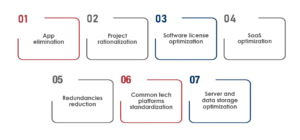- A Brief Overview of Application Rationalization
- Why Businesses Should Rationalize Applications?
- 5 Business Benefits of Application Rationalization
- Challenges of App Rationalization
- How can Tx Assist with App Rationalization?
- Summary
Informed decision-making promotes innovation in the workplace and is one of the primary reasons behind every business’s success across its enterprise infrastructure. Businesses spend a lot on software development to ensure the final product meets demand and helps them stay competitive. The application rationalization process prevents the investment from getting out of hand.
The IT budget can quickly become a burden when paid licenses do not return sufficient value. Concurrently, an economical and effective solution might go unnoticed. However, application rationalization can address all these inefficiencies. Now the question is, ‘How?’ But before that, let us understand what it exactly is.
A Brief Overview of Application Rationalization
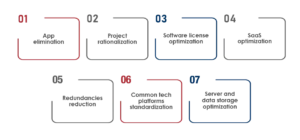
Application Rationalization is the process of evaluating software applications utilized in an organization to determine their necessity, usage, and the value they are delivering. It helps determine which apps should be kept, replaced, eliminated, or consolidated. The process involves leveraging various techniques and methodologies to ensure a more effective implementation of the application landscape. Think of it like cleaning a toy room. As toys are sorted and kept based on the child’s preferences, application rationalization happens when enterprises do the same thing with their business applications.
It is one of the IT cost optimization techniques that act as a base for various cost-saving activities like:
- App elimination
- Project rationalization
- Software license optimization
- SaaS optimization
- Redundancies reduction
- Common tech platforms standardization
- Server and data storage optimization
Businesses can select applications based on how they positively impact the outcomes while balancing the cost and value of suggested apps, constantly monitoring app value, and adjusting the value accordingly.
Why Businesses Should Rationalize Applications?
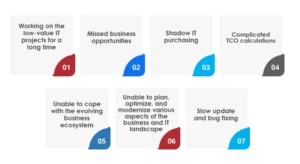
According to a survey, around 70% of companies do not even have a reference document containing the details of the current version of their app portfolio. Such type of carelessness could cost a lot of money. Not having a comprehensive app rationalization protocol can place the business under the following risks:
- Working on the low-value IT projects for a long time
- Missed business opportunities
- Shadow IT purchasing
- Complicated TCO calculations
- Unable to cope with the evolving business ecosystem
- Unable to plan, optimize, and modernize various aspects of the business and IT landscape
- Slow update and bug fixing
Effective rationalization can help identify reinvestment capital and assist businesses in streamlining communication between enterprise personnel and IT stakeholders.
5 Business Benefits of Application Rationalization
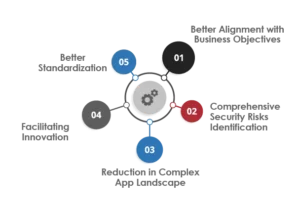
The core concept of application rationalization involves tackling inefficiencies in a business’s IT infrastructure. Businesses majorly adopt large app stacks and later suffer from shadow IT systems, compliance issues, and slow adoption of next-gen tech. Rationalizing apps can help uncover and address these underlying issues swiftly. It offers organizations the following benefits:
Better Alignment with Business Objectives
Businesses get a bird’s-eye view of their application portfolio, which allows them to make strategic business decisions. As a leader, you can reprioritize your IT support for business-critical apps, which can help you improve business agility and facilitate better alignment within the organization.
Comprehensive Security risk identification
Businesses can quickly identify zombie apps and shadow IT issues to prevent security vulnerabilities. They can mitigate backdoors left by unsupported apps that often go unpatched to prevent malicious individuals from gaining access to your IT infrastructure.
Reduction in Complex App Landscape
Most CIOs think their enterprise uses only 30-40 cloud apps, which is definitely not true. Companies run an excessive number of apps that create an overlay of complex landscapes. Application rationalization helps reduce the number of unnecessary apps while streamlining IT management and support. And it’s done by decluttering the IT environment.
Facilitating Innovation
App rationalization is an ongoing process that allows businesses to ensure their application stack does not become dormant for long. They can clear stagnant apps to free up the budget for reinvestment purposes. By analyzing market trends, businesses can shift to new, cutting-edge apps when they are still economical.
Better Standardization
Application rationalization helps establish a consistent framework across the IT ecosystem by eliminating redundant or non-standard applications. This streamlines processes enhances interoperability between systems, and ensures uniformity in software usage, which reduces operational inefficiencies and simplifies compliance with regulatory standards.
Challenges of App Rationalization
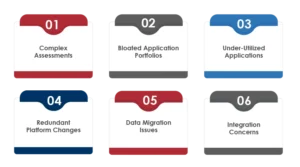
App rationalization is critical for optimizing IT portfolios, but it comes with significant challenges:
- Complex Assessments: Evaluating each app’s value, usage, and relevance across departments can be time intensive.
- Bloated Application Portfolios: Accumulating too many apps over time creates inefficiencies, overlaps in functionality, and higher maintenance costs.
- Under-Utilized Applications: Many apps consume resources without delivering meaningful ROI, requiring thorough usage analysis to identify and address them.
- Redundant Platform Changes: Frequent or unnecessary shifts between platforms can disrupt workflows and inflate costs, making long-term planning critical.
- Data Migration Issues: Transferring data from one platform to another can lead to disruptions and risks if not managed properly.
- Integration Concerns: Ensuring the remaining apps integrate seamlessly with existing systems requires careful planning and execution
How can TX Assist with App Rationalization?

Outdated Applications and legacy systems can hinder progress and increase operational costs. This also brings other challenges, like failing to meet changing compliance standards, struggling with modern tech, being vulnerable to cyber threats, and having redundant and dormant apps.
Tx’s approach to application rationalization aims to ensure your business requirements align with your organizational goals. We evaluate your application portfolio to measure its alignment, value, and performance. We identify retirement apps to improve efficiency, reduce operating costs, and provide reinvestment opportunities for upscaling business strategies. Our application rationalization service consists of the following:
Risk Assessment
We identify each application’s security, compliance, and operational risks, uncover vulnerabilities, and assess their organizational impact.
Rationalization Recommendations
We recommend retaining, retiring, or replacing applications through a detailed rationalization roadmap and strategy.
Consolidation and Integration
We identify redundant functionalities for consolidation and explore integration to streamline the IT landscape.
Governance and Lifecycle Management
We establish governance frameworks for continuous monitoring, updates, and periodic re-evaluation of applications.
Conclusion
Successful organizations require an efficient and robust application portfolio. All medium—and large-scale enterprises have a list of applications that they refine regularly to increase agility, cost-effectiveness, and efficiency. They make this possible by applying application rationalization, a complex process requiring a deep understanding of technical aspects, business objectives, and the current state of the IT portfolio. Partnering with Tx enables organizations to simplify this process through expert guidance and strategic execution. By offering tailored rationalization strategies, including risk assessment, consolidation, and governance frameworks, Tx ensures your IT portfolio aligns with business goals. To know more about Tx application rationalization services, contact our experts now.
The post 5 Reasons Why Your Business Needs App Rationalization first appeared on TestingXperts.
Source: Read More
